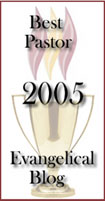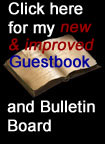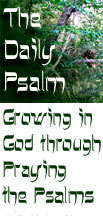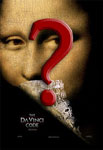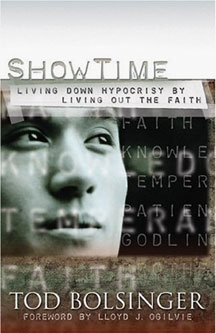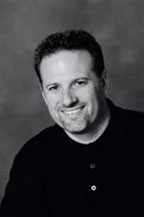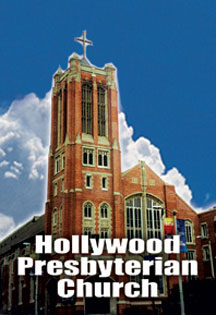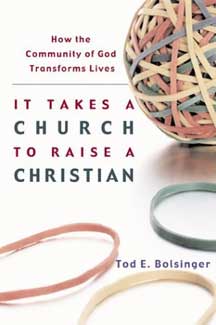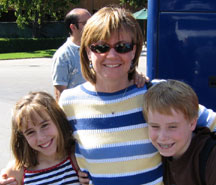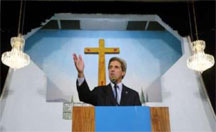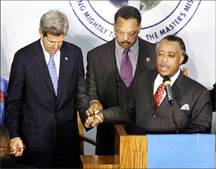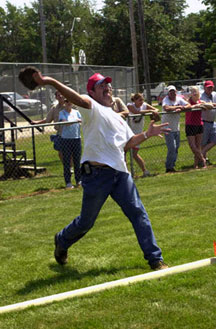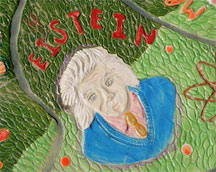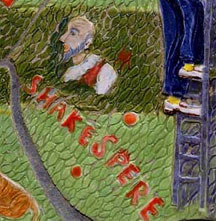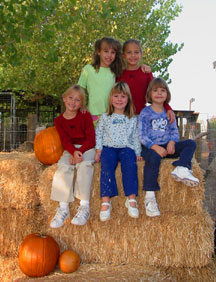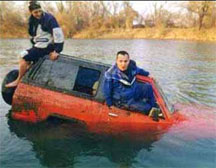| |
Blog Archive for October 2004 |
|
Show Time: An Interview with Tod Bolsinger (Part 2)
Posted at 9:30 p.m. on Saturday, October 30, 2004
This is part 2 of my interview with Tod Bolsinger, author of the newly released Show Time. In part 1, Tod explained that he wrote this book to help “everyday Christians” live out their faith in the real world. This suggested the question: Why is it so hard for us Christians to live out our faith?
MDR: So, Tod, back to where we left off yesterday. Why, do you think, it’s hard for us to live out our faith each day?
Tod: Well, three things immediately come to mind, Mark. First, our own human nature. We tend to “go along to get along.” It is not enough to say with dogged determination, “Today I will make a difference for Christ in the world.” We need the life-transforming grace of Christ, operating in our lives.
Second, we live in a culture that attacks and seduces true expressions of character and integrity at every turn. Temptations to sin, rampant materialism, a lack of shared values, and cynicism that anyone can live noble and virtuous lives leaves most us feeling as if the best we can do is hide our hypocrisy and hope that God will somehow shine through our broken lives. We need to believe that we can learn to live better. |
|
| |
Cool cover, I think. Notice the foreword by Lloyd Ogilve, former chaplain of the U.S. Senate. Not too shabby!
|
MDR: Now, having read your last book, It Takes a Church, I can probably guess your next point. We can’t live better if we’re disconnected from the church, right?
Tod: Exactly. One of the greatest reasons we struggle to live out our faith is that we often try to do it alone, without genuine community. Christian character is a result of the Holy Spirit at work in the regenerated believer who lives and grows within a community of believers who seek to live out the gospel each day. Without the moral discourse, mutual accountability, gracious forgiveness, and continual support of a community of character, all of us will eventually allow the stresses of our culture to shape us in the image of the age.
MDR: So, will this book help us to overcome these problems?
Tod: I hope so. That’s the point. Show Time is meant to be a direct response to all three of those challenges. First, it calls us to truly embrace the life-transforming grace of Jesus Christ that was offered to a flawed fisherman named Peter and is offered to flawed people like you and me.
MDR: There you go again, assuming that I’m flawed. Have you been talking to my wife? Oh well, I suppose you’re right.
Tod: No doubt about it, I’m afraid. Anyway, back to what I was saying. Show Time is a series of word studies that offers us a step-by-step virtue list that holds up the very best character qualities that every culture aspires to attain and equips us to express them through genuine Christian living each day.
MDR: A virtue list? What, did you make this up yourself?
Tod: No. It comes right from the pages of Scripture, from the first chapter of 2 Peter.
MDR: What about the need for community?
Tod: I have meant for Show Time to be read with friends. It is intentionally formatted for small groups or prayer partners to read and discuss. Each chapter offers questions for discussion. My hope is that in boardrooms, meeting rooms, classrooms and kitchen tables small groups of Christian friends will read the wisdom of 2 Peter 1:3-10 and learn to live down hypocrisy by living out the faith.
MDR: Anything else you want to tell us about the book?
Tod: It’s got a lot of cool stories. Really. I love stories and I fill the book with them. Stories of “everyday Christians” who are living out the faith; stories about fishing and hiking; stories about Cal Ripken and Dave Wottle (remember him?), stories from movies and great books. I hope it is not only challenging, but a fun read as well.
MDR: Well, just so long as you don’t include any stories about me and my flaws. Seriously though, you’re a great story teller. I’m sure these illustrations will make Show Time come alive.
Say, I’ve got an idea. How about if I include some excerpts of Show Time in my blog. This will help folks get a feel for your writing. (And, frankly, I think it will help them buy your book!) Will you help me find some suitable excerpts for my readers?
Tod: Sure. That would be great.
MDR: Stay tuned for some excerpts from Show Time by Tod Bolsinger. You’ll be glad you did. I expect I’ll put them up next weekend. But, if you become impatient, you can always buy your own copy today. If you buy it from Amazon, notice who’s got the first review of the book! I do think Show Time is a great tool, not only for individuals, but also for adults groups of various kinds.
Home
Show Time: An Interview with Tod Bolsinger
Posted at 9:30 p.m. on Friday, October 29, 2004
Today’s post is an interview with Tod Bolsinger. His second book has just been published, and I thought my readers would appreciate learning about it “from the horse’s mouth,” as it were. The book is: Show Time: Living Down Hypocrisy by Living Out the Faith (Baker, 2004). In addition to being an author, Tod is the Senior Pastor of San Clemente Presbyterian Church in Southern California. He is also an adjunct professor of practical theology for Fuller Theological Seminary. His previous book, It Takes a Church to Raise a Christian, was the focus of a previous interview I did with Tod. He also is a new blogger. His daily posts are excellent. You should check them out.
MDR: So, Tod, a second book. And so soon. Way to go! Tell us, why did you write Show Time? |
|
| |
The Rev. Dr. Tod Bolsinger (yes, with one 'd'). |
Tod: Theologian Hans Küng reportedly used to tell his divinity students that while they may be experts in Christian theology, lay people are experts in living the Christian life. This book is my attempt as a pastor and theologian to communicate with real-life experts (like many of your website readers) about how to live out a positively contagious vision of the Christian life. It is a critique of Christianity that doesn’t “walk the talk,” a buoyant celebration of some rare but magnificent Christians who do, and biblical instruction in taking steps toward a faith that shows the good news of Christ. It is from start to finish a book for “everyday believers.”
MDR: Now you’re especially concerned about the problem of hypocrisy in the church, right?
Tod: Yes. As I wrote in the introduction, “This book was born of the pain of Christians who have had to ‘live down’ the inconsistent lives of other believers. . . . So much of the hypocrisy of the church results from our tendency to wear two faces: our church face and our real face. Sooner or later, the real face takes over.”
MDR: Now you’re the author of this book, but you’ve said it’s really more of a communal project.
Tod: Indeed. Part of my genuine excitement for this book is that it is the product of a community endeavor. It began as sermons given to San Clemente Presbyterian Church. I developed the series in response to some questionnaires filled out by my congregation, whereby they indicated that they wanted some sermons that “applied Christianity to everyday living.” My sermons were then rewritten for my Wednesday morning men’s small group, who gave me not only ample feedback but in some cases blunt correction. The whole series was then completely overhauled numerous more times through frank conversations with Christian men and women who cared more about what Christianity should mean in the real world than my pride as an author. Finally, a group of professionals in Los Angeles used the book and gave me some additional input.
What you have, then, is the result of many caring people who want their lives and their churches to demonstrate the good news of Jesus in an increasingly effective way. The book is arranged in readable chapters with discussion questions and includes many stories about Christians living out the faith.
MDR: So are you going to share any of the big bucks you make from this book with all of your co-authors? Okay, just kidding. More seriously, though, you say this book is for “everyday Christians.” What can these folks expect to get out of Show Time.
Tod: First and foremost, understanding. This book doesn’t sugarcoat how hard it is to live out our faith each day. Together we look at both the call of the New Testament to “let our lights shine” but we also look at how often all of us, including pastors like you and me, Mark, fall short.
MDR: Ah, yeah, well, okay, I guess so. Can we change the subject now?
Tod: The second thing that I wanted to offer everyday Christians, is good, practical, tried and true wisdom. Not just my “advice” but true wisdom from the word of God that helps us grow, step-by-step in a pattern of biblical character formation.
MDR: So you’re helping people to live out their faith in the real world where they live. Sounds good. But this suggests a question. Why is it so hard for us Christians today to live out our faith?
I’ll give you some time to think about this, Tod, since I’m going to take a blog break now. We can continue the conversation tomorrow, if that’s okay with you.
Tod: Yes, great.
MDR: So come back tomorrow for part 2 of my interview with Tod Bolsinger, author of Show Time.
Home
The Joys of Corporate Prayer?
Posted at 9:30 p.m. on Saturday, October 23, 2004
Introduction to the sermon, "Conversing with God"
As I think back of experiences I have had praying with other Christians, I'm flooded with a wide variety of memories. Some are deeply moving; others are, well, rather humorous.
When I was leading the college group at the First Presbyterian Church of Hollywood, one of my student leaders was a young man named Phil. Bright, conscientious, and deeply committed to Christ, Phil actually went on to become an ordained Presbyterian pastor. But he got his start as a worship leader in the College Department at Hollwood Pres. It wasn't an altogether smooth start, however, which is usually the case when we're trying new things.
On one occasion Phil was the designated prayer leader for the group. As he began his prayer, Phil was obviously unsure of how he would address God that morning. "Father" was his usual option. But for some reason Phil was leaning toward "Master" that day. But, in his confusion, instead of praying "Dear Father" or "Dear Master," what came out of Phil's mouth, plain as day, was "Dear Fat Master." Now that was something I hadn't heard before! The group tried for a couple of seconds to keep from laughing, but to no avail. Soon we were all howling, while poor Phil's face turned scarlet.
| Now I had a few of my own embarrassing experiences in prayer while I was on the staff of the Hollywood church. One Sunday morning I was a worship assistant, which meant I was elegantly robed and seated on one of the "thrones" that sat upon the sanctuary chancel. I had the prayer of invocation and the announcements that day. One of the other pastors had the pastoral prayer, four minutes of eloquent intercession that transitioned neatly into the Lord's Prayer. As he began this prayer, I found myself feeling a little woozy. The next thing I knew, the whole congregation was praying the Lord's Prayer, except for me, of course, because I was sleeping. Yeow! Only a few friends figured out what had happened to me. I'm sure many in the congregation were convinced that I was so deep in prayer I didn't bother to say the words of the Lord's Prayer. But deep in sleep was more like it! |
|
|
Suffice it to say I've had some of my greatest times as a Christian when praying with other believers. And, if truth be told, some of my more entertaining times as well.
Corporate Prayer at the Center
Prayer. It may be the most common activity among Christians. Of course the forms different widely, from chanted prayers of Catholic monks, to shouted prayers from Hispanic Pentecostals, to highly liturgical Anglican prayers, to spontaneous Evangelical prayers, to silent Quaker prayers, etc. etc. But, no matter what the form, wherever Christians gather, you'll find them in prayer together.
This happened right from the get-go. In Acts 2 we read that the earliest believers "devoted themselves to the apostles' teaching and fellowship, to the breaking of bread and the prayers" (v. 42). The plural noun "prayers" with the definite article "the" suggests that the first Christians continued to participate in the established rotation of Jewish common prayers. And we know from elsewhere in Acts that they gathered for more spontaneous corporate prayer as well. To be sure, the individual believers would have prayed on their own, following the instruction and example of Jesus. But Acts 2 emphasizes their coming together for the purpose of prayer. Corporate prayer stands right at the center of the church.
To continue with this sermon, click here.
Home
Links & Laughs, Volume 3
Posted at 9:30 p.m. on Friday, October 22, 2004
As you may know, I am one of the “blog-children” of Hugh Hewitt. Not only did Hugh inspire this blog, but he rather pummeled me into submission to get me to do it (with his logic, of course, not his fists). Well, I have my own first “pummelee.” My friend, fellow pastor, and fellow writer, Tod Bolsinger has just started a blog. I’ve been bugging him about this for months, because Tod has lots of worthwhile things to say, and I’ve felt sure that he’d be a great blogger. If you visit his new site, It Takes a Church, you’ll quickly see that I was right. Tod is a creative thinker and communicator, whether in speaking or in writing. His current series on “stability as a spiritual discipline” is fresh and engaging. Don’t miss it.
Here's a brief excerpt from "Blessed Are Those Who Stay Put":
Over the next few posts I want to take up this idea of stability as a spiritual discipline and a key to the life that God wants for us. Amidst all of the reasons to believe that Christian community is important, perhaps we have never really considered that our hanging out would please God.
|
|
| |
|
Now that we’ve survived the presidential debates, pundits are once again “debating the debates.” Some are suggesting that this format for discussion just isn’t working. Maria Parra, candidate for Congress in Indiana, would surely agree. Recently, in the middle of her only debate with her opponent, Ms. Parra walked off the set. It turns out that she was struggling with stage fright. I expect that most people can sympathize with her struggle, because the fear of speaking in front of groups is one of the most common of all fears. Yet understanding may not translate into votes for Ms. Parra, I’m afraid. Even she recognizes this. According to the news story, “Parra acknowledged that backing out would hurt her politically, but said she hoped people would understand.” Yep, given the fact that we expect our congressional representatives to make speeches in front of people, I expect that Parra’s recent episode won’t help her political career. I hope she keeps her day job.
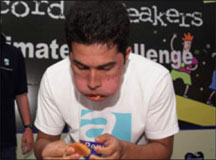 |
I want to close with a couple of “big food” stories. The first comes from Singapore, where Ezra Nicholas recently set a world record by stuffing more than three McDonald’s hamburgers into his mouth, without swallowing. The previous record holder had only managed to get three burgers in his mouth at one time. Nicholas was exultant over his record: “I just thought to myself, I’ve got to do this, I’ve got to do this,” he said. “I’m on top of the world right now, because everyone’s going to know that I can shove more than three burgers in my mouth.” Doesn’t this bring tears to your eyes? Parents, as you envision a great future for your children, don’t forget about the mouth stuffing category. And when I think of all those times my mother told me not to take such big bites. I’m afraid she has deprived me of glory. But, maybe with practice, I can at least manage to jam my mouth with two burgers at once. It’s worth a try, anyway. |
Ezra Nicholas conquering the unconquerable.
|
|
| In the “big food” category comes a story from Suffolk, England, where a family recently grew an apple that weighed two-and-a-half pounds, measuring 18 inches around. The giant fruit was a Bramley apple, a variety grown only in Britain and generally regarded as great for apple pies. The proud growers of the huge apple were the members of the Corston family, who faithfully fertilized their apple tree with manure from a next-door farm. Six-year old Jamie Corston hopes to eat the apple in the form of two apple pies. |
|
| |
Six-year old Jamie Corston tackles "the big apple." |
Home
Thanksgiving Surprise
Posted at 9:00 p.m. on Saturday, October 16, 2004
The introduction to my sermon "Feasting Together"
One of the hardest parts of going away to college was being away from my family for holidays. I was able to come home from the east coast for Christmas, but otherwise I spent Thanksgiving, Easter, and even my birthday far away from home. Yet I was almost always included in some family gathering through my church.
I remember so well the Thanksgiving of my sophomore year. A young couple from church invited me and two friends to join them for Thanksgiving dinner. Mike was a graduate student at Harvard. His wife was known as June, but actually her name was Junko. June/Junko was born in Japan, but had lived in the U.S. for a number of years.
By the time we arrived at their apartment, the pungent aroma of roasting turkey filled every room. Welcomed by such a fine smell and by Mike's hearty greeting, I began to feel a little less homesick. June had been laboring in the kitchen all day to produce the perfect Thanksgiving meal, with turkey, stuffing, mashed potatoes, cranberry sauce, and pumpkin pie. She even added some special touches, making a number of Japanese delicacies to complement the American staples.
| When we sat down for dinner, Mike opened in prayer, and then we dug in. The turkey was just right, not too dry. The mashed potatoes had come from real potatoes, not Styrofoam potato buds or Ivory soap flakes. After enjoying such traditional fare, I decided to be bold - and polite - by trying one of the Japanese specialties. I picked up some little black thing, which I later understood was wrapped in seaweed, and popped it into my mouth. But when my teeth sank into this treat and its flavor began to pervade my mouth, I realized that there was no way this thing was going to go down my throat. I was quite sure that if I even tried to swallow it, I'd disgorge the entire contents of my stomach. Not a welcome adjunct to a Thanksgiving dinner. |
|
| |
Kobumaki, a Japanese kelp roll. I think this is what I tried on that fateful Thanksgiving |
At first I didn't know what to do. So I waited, trying to ignore the disgusting flavor in my mouth. Finally, when everyone's attention was focused elsewhere, I pretended to cough, rushing my napkin to my mouth, and secretly deposited that Japanese delicacy in my napkin. Nobody saw what I had done. Waiting several minutes just in case someone suspected my subterfuge, I finally excused myself to go to the bathroom, where I promptly sent that black treat to an untimely death.
As you might already have guessed, I didn't indulge in any of the other Japanese delicacies that day. I stuck to good ol' American holiday food. And it was wonderful! Moreover, I felt truly welcomed by my friends, as we enjoyed not only delicious food, but lively conversation around the table.
The Meaning of Breaking Bread
If you spoke in the idioms of New Testament Greek, you'd say that Mike, June, my friends, and I "broke bread" that Thanksgiving day. And if you knew the New Testament well, you'd recognize that what I experienced that day in 1976 was very much like what happened in the earliest Christian church, as the first believers "devoted themselves to the apostles' teaching and fellowship, to the breaking of bread . . . ." For the rest of this sermon, click here.
Home
Happy Birthday, Linda!
Posted at 10:30 p.m. on Friday, October 15, 2004
| Note: If you’re new to my blog, I should explain that I tend to put up serious stuff during the week, with lighter fare on the weekend. I’ll get back to my series “Was Jesus Divine?” early next week. |
Today is my wife’s birthday. I won’t give away her age, or mention the fact that she is a few months older than I am. (Oops!) But I do want to wish her a public “Happy Birthday!” and share a few thoughts about why Linda is such a great person. (Okay, I am biased, I’ll admit it, proudly.)
For one thing, she is honest. I’ve been sitting here trying to think of a time when Linda told a lie, even a little one, but I can’t come up with one. (Of course there are the happy “white lies” associated with covering up a surprise party for a friend, but these don’t count.) The fact is that my wife tells the truth, even when it’s hard.
And it is hard, sometimes. Suppose, for example, that Linda doesn’t especially appreciate one of my sermons. Now usually she keeps quiet about her critique because she wants to be kind. But sometimes I’ll venture to ask, “So, what did you think of my sermon?” Now this puts Linda in a tough spot, I’ll admit. It would be so much easier for her simply to tell a bit of a lie. But she won’t do it. (Sigh!) Now she’s always kind in the what she says, but she’ll tell me the truth no matter what.
If I look only at this awkward moment, I could almost wish Linda would spin things a bit more in my favor. But as I look at the bigger picture, I can’t tell you how much it means to me to know that my wife will tell me the truth, even when it hurts. This is a huge gift in my life. |
|
|
Linda at a recent family bowling party. Check out that form! |
|
Linda with our two kids on the occasion of Nathan's return from camp. |
There’s another reason I appreciate Linda’s honesty, and this brings me to my next point. My wife is very wise. Now she’s darn smart when it comes to ideas (with two earned master’s degrees to show for it, and lots of experience as a college teacher). But Linda’s wisdom is more than intellectual. It’s intuitive and relational. She has a great sense for how people are feeling and reacting. This is not my strong suit, let me tell you. But it is Linda’s. I can’t even begin to count how many times I’m ready to charge off and do something relationally stupid when Linda asks, “Have you thought about how so-and-so will feel about that?” Usually the answer is “No, of course not.” Linda’s people-wisdom and relational-wisdom are exceptional, and I’m one of the prime beneficiaries.
I could go on and on. But I’ll stop now. Maybe I’ll add more next year. In the meanwhile, I close on this note: “Happy birthday, dear Linda!
Home
A Surprising Voice Crying Out in the Wilderness
Posted at 9:30 p.m. on Thursday, October 14, 2004
Please forgive me for interrupting my latest series ("Was Jesus Divine?") just as it’s getting going, but I saw a news story today that deserves comment.
In my recent series “The Church and Politics in America” I noted the church-state concern expressed by the secular media and liberal Christians over the increasing chumminess between the Republican Party and evangelical churches. But I wondered what we don’t hear the same concern when Democrats cozy up with more liberal churches. Implicitly, I was accusing the secular media and liberal Christians of having a rather obvious double standard.
Now I’ve found at least one liberal Christian who has the courage to reject this double standard.
The story begins last Sunday as presidential-candidate John Kerry visited the Friendship Missionary Baptist Church, a black church in Miami, Florida. Not only did he get the pulpit to advance his candidacy, but also several other speakers made a display of partisanship that outflanks the most obvious efforts of the Christian Right. The Rev. Al Sharpton spoke of this next election as a “big payback” for President Bush. Former Democratic congresswoman Carrie Meek explained that Kerry is “fighting against liars and demons.” The pastor of the church introduced Senator Kerry as “the next president of the United States.” So much for the neutrality of the church in partisan politics.
In the days following this partisan pep rally, I watched to see if any of the media or other liberal spokespersons would offer the tiniest criticism of what happened in the Friendship Missionary Baptist Church. The silence was deafening. But then, today, a story caught my eye: IRS Asked to Probe Kerry Appearance at Church. (Thanks to Presbyweb for the link.) |
|
| |
Kerry in the pulpit of Friendship Missionary Baptist Church in Miami |
|
| |
Kerry and a couple of his friends praying. Jesse, I see you peeking! |
So which right-wing group asked for an IRS investigation? None. The request came from Barry Lynn, Executive Director of Americans United for Separation of Church and State. Though you may not be familiar with Rev. Lynn’s name, odds are you’ve seen him on television. He’s a frequent talking head, almost always on the liberal, secular, and anti-church side of issues, both theologically and politically. Lynn once worked for the ACLU, and he usually brings the ACLU’s anti-religious bias to his work at American United. I can’t ever remember liking much of what Barry Lynn has said or written. For example, he has been critical of the inclusion of “under God” in the Pledge of Allegiance, and has lobbied for its removal.
But now I have to give the Rev. Lynn credit both for discernment and for guts. My guess is he will take a beating from some of his friends for speaking out against: 1) a black church, and 2) a pro-Kerry, pro-Democratic event, especially in such a close election. Lynn could have waited until after November 2, of course. But he didn’t. And I have to give him kudos for this. It shows a measure of integrity that one doesn’t often find among partisan pundits.
If you’ve read my series on “The Church and Politics in America,” you know that I’m not commending Barry Lynn because his action is somehow anti-Kerry or pro-Bush. But had he attacked some evangelical church that hosted the President, it would be hard to untangle Lynn’s own mixed motives. In the case of Friendship Missionary Baptist, however, he deserves credit for taking a stand that’s consistent with his convictions, potentially controversial, and, I’d imagine, contrary to his personal political leanings. Of course I’m not happy that a Christian church, which probably does lots and lots of fine things, might lose its tax exempt status for a while. But if that church has broken the law, then it should be held accountable for its behavior, just like any other church, including mine.
I believe that credit should be given when credit is due. So I want to thank the Rev. Barry Lynn for pointing out a breach of church-state separation, even and especially when he might share the sentiments of those who opened the breach.
Home
Lonely Richard
Posted at 9:30 p.m. on Saturday, October 9, 2004
The first part of my sermon "Sharing Real Life"
I love having people from church share what God is doing in their lives. Call it a lay witness. Call it a testimony. Call it sharing. But whatever the label, this is a great thing for a church. It's something I'd like to see a lot more of in this church, let me tell you.
But there's a certain danger factor in lay witnesses. I will never forget the time a man I'll call "Richard" shared his testimony at the First Presbyterian Church of Hollywood. It happened on my watch, at an all-church Wednesday evening gathering. Richard had volunteered to testify. I didn't know him well at all, but leaders in the church whom I trusted said that he had a powerful testimony. So I was more than happy to have Richard share.
Richard began with a sad story of being lonely for most of his life. He didn't have many friends growing up. He always felt left out. And this feeling continued into adulthood. I could already see where Richard was going with this. He was active in one of our strongest adult fellowship classes, and I was sure the punch line of his testimony was how great it felt to be accepted in this group. "Excellent," I whispered under my breath.
Richard continued on narrating the miseries of loneliness. Glancing at my watch, I noticed that he'd already spent three minutes on this sad tale. It was about time for Richard to get to the good stuff, and tell us what a loving church we were. But Richard droned on and on about his difficulties in finding friends. Secretly, I thought to myself, "Yes, and now I'm beginning to see why."
Finally he talked about coming to Hollywood Presbyterian Church. "At last," I sighed, "now we'll get the real testimony." But of course Richard began this chapter in his story by telling us how hard it had been to get to know people at the church, and how we weren't as friendly as we seemed to be, etc. etc. By now we were about five minutes into the testimony - way over time, I might add - and still no punch line. I was getting nervous and a little bit ticked off, to tell you the truth.
Eventually Richard got around to talking about his fellowship class. "Finally!" I thought. But still he sounded rather like Eyeore: "Oh me, oh my. It's hard to make friends in this class. I feel kinda lonely. This church really isn't very friendly." And at that, he stopped, and sat down.
There it was, seven minutes of Richard's sad story, ending in one big complaint about the church. I turned briefly to look at those who had recommended Richard to me, long enough to notice and to enjoy the horrified looks on their faces. Of course then it was my job to segue from Richard's sad story to an upbeat dismissal. By God's grace, I suggested that we pray for Richard and others like him, and that God would help us to be a friendlier church. And, no, I did not pray that Richard would get a personality. But I did think it! |
|
|
In retrospect, I'm glad Richard felt free enough to tell the truth about his loneliness. It actually helped people reach out to him. And our church needed a good swift kick in the hindquarters when it came to being friendly. It's all too easy for us Christians to be nice to those we already know, but fail to reach out to others. A periodic reminder to look beyond ourselves is helpful.
I'm also glad that the church is a place where people like Richard can actually find a home. Just about every other social group would have had nothing to do with a sorry many like him. But the church seems to understand, even if we don't like it, that we have an obligation to include someone like Richard. This isn't necessarily the fun part about being the church, but it is an essential part. As we see in Acts 2, every believer in Jesus Christ needs and deserves to be part of his fellowship. Every one of us should be devoted, not only to the apostles' teaching, but also to fellowship.
To continue this sermon, click here.
Home
Links & Laughs, Volume 2
Posted at 9:30 p.m. on Friday, October 8, 2004
My blog faithful seemed to like last Friday’s “Links & Laughs,” so I’ll put up Volume 2. If you’re new to my website, let me explain that I usually do my heavy lifting during the week, with lighter duty on the weekend. (Doesn’t “putting up” suggest a weightiness metaphor?) So my series on “Christian Inclusiveness” will continue, on Monday, I expect. (I also reserve the right to interrupt myself if needed.)
Mark Sides of Sidesspot has blogged on the need for Christians to treat one another with love even when disagreeing about matters of theology. A helpful reminder, and in some cases a badly-needed rebuke!
It’s too bad that the Reverend Curtis Lucas hadn’t read Mark Sides’s post when he decided to bite a police officer during a traffic stop. Yeow! But, Rev. Lucas seemed to recover his loving attitude later on. In a letter of apology read in his legal hearing, the Reverend said, “If I had to repeat the events of that evening, I would just have signed the ticked.” Ah, how sensible! It looks like Rev. Lucas learned his lesson.
Dr. Al Mohler, President of the Southern Baptist Theological Seminary and inveterate blogger, has put up a very helpful review of a very helpful book by Robert A. J. Gagnon and Dan O. Via, Homosexuality and the Bible: Two Views. Though I have not yet read this book, I’m familiar with the scholarly work of both authors. Gagnon is the best on homosexuality, and Via is a highly regarded scholar among those who study the New Testament academically. Mohler calls this book “a landmark achievement in the church’s debate over homosexuality.” He believes it should be “mandatory reading for every thinking Christian.” Okay, on Al Mohler’s recommendation, and because I have top regard for Robert Gagnon’s work, I just went to Amazon and ordered this book (really!). You should do it too.
Some time ago I blogged about cell phones in church . . . I hate them! Now some churches in Mexico have a solution: electronic jamming! Using technology developed by Israeli military experts, these churches are prohibiting members from receiving cell phone calls during worship services. Now that’s a solution! Of course it is illegal in the United States, so we’re still stuck with shame and scolding as our only options.
All worship leaders should check out the helpful article at the Worship Leader magazine website: “Modesty Matters” by Natalie Murray. A timely word, especially for women, but also for men.
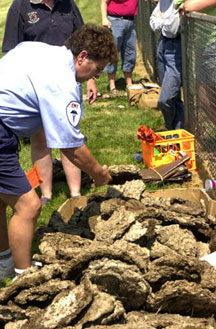 |
In the “I hate it when that happens” category, Oklahoma tourism officials have recalled their latest publicity brochure. It seems the brochure had potentially offensive pictures, such as photos of civil war re-enactments under the Confederate flag and of a cow-chip throwing contest. The new state tourism director explained, “Images are powerful. They have to be selected with caution.” Ah, yes, good point. Too bad the former tourism director didn’t think of this before Oklahoma spent $46,000 for the brochures. Plus, there were numerous grammatical and spelling errors in the brochure. |
|
A contestant choosing the perfect cow chip. |
|
|
James Pratt, the proud winner of the contest. What form! |
Speaking of spelling errors, the city council of Livermore, California is in a mess of trouble concerning a $40,000 mural recently unveiled outside of the new city library. This mural, which depicts famous figures throughout history, unfortunately misspells some of their names. Messrs. Shakespere and Eistein must be roaling ovur in they’re graives. The city council voted to put up another $6,000 to get the artist to fix her work. (Isn’t there some sort of money-back guarantee on these things??) The artist, however, is ticked off that she has to make the corrections. She said: “The importance of this work is that it is supposed to unite people. They are denigrating my work and the purpose of this work . . . . The people that are into humanities, and are into Blake’s concept of enlightenment, they are not looking at the words. In their mind the words register correctly.” Oh-kay, if you say so. The artist better hurry out to Livermore to give a seminar on Blake’s concept of enlightenment.
No, there's no truth to the rumor that Dan Quayle, archetypal misspeller, had anything to do with this project. |
|
|
|
A late breaking story. She isn’t coming. Either to fix her work or to teach the seminar I suggested. She says, “No, I will not return to Livermore for any reason. There seems to be so much hatred with certain people. They continuously look for a scapegoat. I guess I am the sacrificial goat.” Or maybe sacrafishul gote, if you look at this from a Blakian point of view.
I’ve got an idea for the Livermore city council. Look closely on the mural for anything that looks like a Christian cross, even if it’s tiny. Then you can take out the whole mural and start again.
Maybe the guy who did the Oklahoma tourism brochure was a disciple of William Blake. I don’t know what Blake would have thought of cow-chip throwing contests, however.
Home
What Comes First
Posted at 9:30 p.m. on Saturday, October 2, 2004
The first part of my sermon, "Revealed Truth"
| When my son Nathan was about five years old we went on a marvelous summer vacation. First, we drove to Mammoth and spent a week staying in a condo up there, taking little hikes in the mountains and playing endlessly in the community park, which Nathan called "Windy Park" because the evening gusts were so strong. Then we flew to Wisconsin to spend a couple of weeks with friends who had a small resort on Long Lake. We enjoyed boating, fishing, walking in the woods, and visiting the annual Rutabega Festival in Cumberland, Wisconsin, where Nathan loved going on the carnival rides. |
|
| |
Nathan jumping into Long Lake four years later. |
When we returned home, my mother asked Nathan about the trip. "So tell me about your trip, Nathan, what did you do? What was your favorite part?" Without missing a beat, Nathan answered: "I liked it when we got our car washed at the car wash." Great, I thought. We just carted this boy halfway across country. He's seen gorgeous natural vistas, swum in crystal blue lakes, and eaten lots of Wisconsin fried food, and the best he can come up with is getting the car washed, which actually happened the day before our vacation started? But, from the perspective of a five-year-old, seeing our van getting sprayed and soaped was a big deal, so he mentioned it first.
Grown ups also mention first what they tend to value most. If you ask a good friend of mine about any church service, he'll always begin by describing the size of the crowd. It doesn't matter what actually happened in the service. It could have been the most glorious worship since Pentecost. There might have been visible tongues of fire and prophecies in unknown languages. But none of this matters. First of all my friend will tell you, "Well, the crowd was very strong" or "It seemed like a whole lot of people weren't there today." This friend, you see, values getting a lot of people in church, so he mentions it first.
What Luke Mentions First
When Luke wrote the Book of Acts, the companion volume to his gospel, he described the activities of the earliest believers in this way: "They devoted themselves to the apostles' teaching and fellowship, to the breaking of bread and the prayers" (2:42). Now in fairness to my crowd-counting friend, Luke did mention in verse 41 that "about three thousand persons were added" to the core of the church that day. Then he tells us what these folks actually did once they acknowledged Jesus as Savior and were baptized. Notice carefully what Luke says first: "The devoted themselves to the apostles' teaching." This tells us a whole lot about Luke's own priorities. But, more importantly, it also tells us bundles about the priorities of the early church and, indeed, the priorities of God for the church.
Let me but the matter simply: When the church of Jesus Christ has its act together, it will always be devoted to the apostles' teaching. To continue this read, click here.
Home
Links & Laughs
Posted at 5:00 p.m. on Friday, October 1, 2004
Happy October! This is one of my favorite months of the year (especially when I lived in New England). Today you’ll get some links and laughs. I’ll get back to “Christian Inclusiveness” in a couple of days.
Mark Daniels of Better Living laments the presidential debate format and suggests an alternative.
Mark Sides of Sidesspot adds a challenging piece on “With a continual lust for more.”
No. I am not partial to bloggers named Mark, unless they're good.
Prolific author and church-researcher, George Barna, argues that children should be the church’s top priority. See this review of his book at crosswalk.com.
The three Los Angeles County Supervisors who voted to remove the cross from the county seal (see my series) have been sued by a consortium of people, who claim an anti-religious bias in the Board of Supervisors. So if the Supervisors made the change to avoid being sued by the ACLU, now they’re just plain stuck. |
|
| |
My daughter and some of her friends at a pumpkin patch -- an October tradition.
|
The former Archbishop of Canterbury, Lord George L. Carey, has gone on record criticizing the Los Angeles Episcopal Diocese for suing the three congregations that have left the diocese to join the Anglican Church in Uganda. According to Lord Carey, "There's room, therefore, for understanding and generosity without going to the law." Amen to that! I had suggested such a thing in my series on the matter. (No, there’s no evidence to suggest that Lord Carey had read my series. Perhaps it would be safer to say that biblically-informed minds think alike, at least sometimes.)
News Flash: Last Thursday a Wisconsin state appeals court ruled that it is illegal to drive drunk on frozen lakes. Presumably it isn’t advisable to drive drunk on non-frozen lakes too, but the court overlooked this piece of wisdom. Perhaps they realized that only drunk drivers would attempt to drive on liquid lakes. The appeals court ruling, seemingly innocuous, might have a devastating impact on the winter ice fishing trade. Since most so-called “ice fishers” are sitting in their little shacks doing you know what . . . not catching fish, of course, but drinking beer.
My fellow pastor Steve Wright suggests a great resource on the church, a series of downloadable lectures by N.T. Wright. I haven't listened to these yet, but Wright is always worth hearing. He's a top notch scholar as well as a fine pastor. Check out the recommendation at Steve's website, Porch Pondering. (Don't you love that name?)
Finally, a movie theatre in Houston, Texas was forced to close because of reports of a large snake in their complex. Was the snake sneaking in to see the recent thriller (well, sort of) Anacondas, which was showing at the theatre? Maybe theatres should think twice before showing Godzilla next time. You wouldn't really want one of those running around in the corridors. |
|
|
Too bad the court didn't rule before this driver attempted the lake. |
|
No amount of legal advice will help these guys, I'm afraid. |
|
So you're supposed to spend the whole day out in this shack fishing? And that's fun? It's easy to see why they drink beer. |
Home
|
